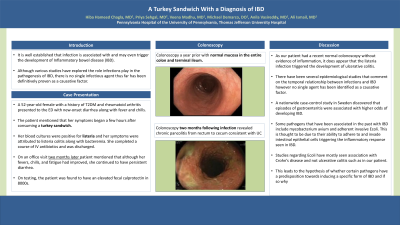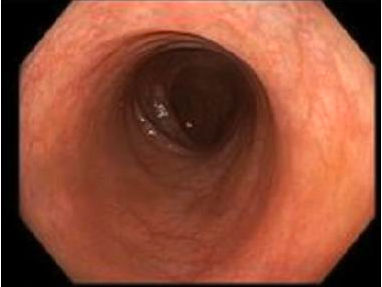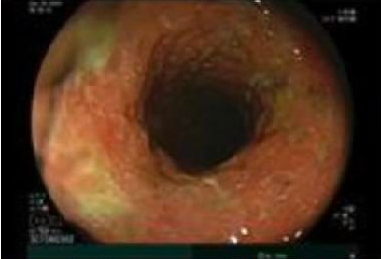Tuesday Poster Session
Category: IBD
P5542 - A Turkey Sandwich With a Diagnosis of IBD
Tuesday, October 28, 2025
10:30 AM - 4:00 PM PDT
Location: Exhibit Hall

Has Audio

Hiba Hameed Chagla, MBBCh
Penn Medicine
Philadelphia, PA
Presenting Author(s)
Hiba Hameed Chagla, MBBCh1, Priya Sehgal, MD, MS, MPH2, Micheal Demarco, DO1, Anila Vasireddy, MD3, Ali Ismail, MD3, Veena Madhu, MD4
1Penn Medicine, Philadelphia, PA; 2Thomas Jefferson University Hospital, Philadelphia, PA; 3University of Pennsylvania Health System, Philadelphia, PA; 4University of Pennsylvania, Philadelphia, PA
Introduction: It is well established that infection is associated with, and may even trigger the development of Inflammatory bowel disease (IBD).Although various studies have explored the role infections play in the pathogenesis of IBD, there is no single infectious agent thus far has been definitively proven as a causative factor.
Case Description/Methods: In July 2024, a 52-year-old female with a history of type II diabetes mellitus and rheumatoid arthritis (not on any current medications) presented to the ED with new onset diarrhea along with fever and chills. The patient mentioned that her symptoms began a few hours after consuming a turkey sandwich. Her blood cultures were positive for listeria and her symptoms were attributed to listeria colitis along with bacteremia.She completed a course of IV antibiotics and was discharged. On an office visit two months following discharge patient mentioned that although her fevers, chills, and fatigue had improved, she continued to have persistent diarrhea. Further investigation was performed. While the EGD was unremarkable, the colonoscopy revealed chronic pancolitis from rectum to cecum consistent with ulcerative colitis. The patient was also found to have an elevated fecal calprotectin in 8000s. Of note, this patient had undergone a screening colonoscopy done exactly a year before her listeria infection (September 2023) and had normal mucosa in the entire colon and terminal ileum.
Discussion: As our patient had a recent normal colonoscopy without evidence of inflammation, it does appear that the listeria infection triggered the development of the ulcerative colitis.There have been several epidemiological studies that comment on the temporal relationship between infections and IBD however no single agent has been identified as a causative factor. A nationwide case-control study in Sweden discovered that episodes of gastroenteritis were associated with higher odds of developing IBD. Some pathogens that have been associated in the past with IBD include mycobacterium avium and adherent invasive Ecoli.This is thought to be due to their ability to adhere to and invade intestinal epithelial cells triggering the inflammatory response seen in IBD. Studies regarding Ecoli have mostly seen association with Crohn’s disease and not ulcerative colitis such as in our patient. This leads to the hypothesis of whether certain pathogens have a predisposition towards inducing a specific form of IBD and if so why.


Disclosures:
Hiba Hameed Chagla, MBBCh1, Priya Sehgal, MD, MS, MPH2, Micheal Demarco, DO1, Anila Vasireddy, MD3, Ali Ismail, MD3, Veena Madhu, MD4. P5542 - A Turkey Sandwich With a Diagnosis of IBD, ACG 2025 Annual Scientific Meeting Abstracts. Phoenix, AZ: American College of Gastroenterology.
1Penn Medicine, Philadelphia, PA; 2Thomas Jefferson University Hospital, Philadelphia, PA; 3University of Pennsylvania Health System, Philadelphia, PA; 4University of Pennsylvania, Philadelphia, PA
Introduction: It is well established that infection is associated with, and may even trigger the development of Inflammatory bowel disease (IBD).Although various studies have explored the role infections play in the pathogenesis of IBD, there is no single infectious agent thus far has been definitively proven as a causative factor.
Case Description/Methods: In July 2024, a 52-year-old female with a history of type II diabetes mellitus and rheumatoid arthritis (not on any current medications) presented to the ED with new onset diarrhea along with fever and chills. The patient mentioned that her symptoms began a few hours after consuming a turkey sandwich. Her blood cultures were positive for listeria and her symptoms were attributed to listeria colitis along with bacteremia.She completed a course of IV antibiotics and was discharged. On an office visit two months following discharge patient mentioned that although her fevers, chills, and fatigue had improved, she continued to have persistent diarrhea. Further investigation was performed. While the EGD was unremarkable, the colonoscopy revealed chronic pancolitis from rectum to cecum consistent with ulcerative colitis. The patient was also found to have an elevated fecal calprotectin in 8000s. Of note, this patient had undergone a screening colonoscopy done exactly a year before her listeria infection (September 2023) and had normal mucosa in the entire colon and terminal ileum.
Discussion: As our patient had a recent normal colonoscopy without evidence of inflammation, it does appear that the listeria infection triggered the development of the ulcerative colitis.There have been several epidemiological studies that comment on the temporal relationship between infections and IBD however no single agent has been identified as a causative factor. A nationwide case-control study in Sweden discovered that episodes of gastroenteritis were associated with higher odds of developing IBD. Some pathogens that have been associated in the past with IBD include mycobacterium avium and adherent invasive Ecoli.This is thought to be due to their ability to adhere to and invade intestinal epithelial cells triggering the inflammatory response seen in IBD. Studies regarding Ecoli have mostly seen association with Crohn’s disease and not ulcerative colitis such as in our patient. This leads to the hypothesis of whether certain pathogens have a predisposition towards inducing a specific form of IBD and if so why.

Figure: Normal Descending Colon, September 2023

Figure: Descending Colon with chronic inflammation, September 2024
Disclosures:
Hiba Hameed Chagla indicated no relevant financial relationships.
Priya Sehgal indicated no relevant financial relationships.
Micheal Demarco indicated no relevant financial relationships.
Anila Vasireddy indicated no relevant financial relationships.
Ali Ismail indicated no relevant financial relationships.
Veena Madhu indicated no relevant financial relationships.
Hiba Hameed Chagla, MBBCh1, Priya Sehgal, MD, MS, MPH2, Micheal Demarco, DO1, Anila Vasireddy, MD3, Ali Ismail, MD3, Veena Madhu, MD4. P5542 - A Turkey Sandwich With a Diagnosis of IBD, ACG 2025 Annual Scientific Meeting Abstracts. Phoenix, AZ: American College of Gastroenterology.
